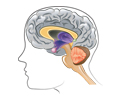Family member wellness is associated with a patient's recovery. Cortisol hormone helps determine family members who are likely to suffer from long-term effects.

‘Family members of critically ill patients suffer long-term effects and cortisol hormone aids in determining those members who are at risk of anxiety.’





The study is believed to be the first research of its kind to investigate the link between cortisol levels of family members of adult ICU patients and subsequent anxiety.Participants in the study were family members of patients who'd been admitted to Intermountain Medical Center's medical/surgical intensive care unit. Family members were followed by researchers for three months.
Three months after the patient was discharged, researchers found that 32 percent of the family members studied were anxious, 16 percent had symptoms of depression, and 15 percent reported signs of post-traumatic stress.
Researchers also found an increase of about 50 percent in family members' cortisol levels after they woke up in the morning, which was associated with anxiety in family members three months after hospital discharge.
Cortisol is sometimes called the "stress hormone" because it can spike during periods of stress, such as when a loved one is critically ill. Unlike the surge in cortisol shortly after awakening, general cortisol levels weren't found to predict long-term symptoms of mood disorders among participants in the study.
Advertisement
Family members need time to adjust to these new roles, situations and responsibilities, said Elliotte L. Hirshberg, MD, MS, a critical care physician at Intermountain Medical Center, who led the study, and who co-directs the Center for Humanizing Critical Care at the hospital.
Advertisement
Researchers targeted family members because they're an important part of a patient's recovery team and often have their own unmet needs. There's likely a link between family member wellness and a patient's trajectory for recovery, Dr. Hirshberg said.
Researchers enrolled families of patients who were gravely ill. Various groups were excluded, including those with a history of PTSD, dementia, or schizophrenia and those on medications containing steroids, which impacts cortisol secretion.
Post-intensive care syndrome in families, sometimes called PICS-F, is a widely recognized syndrome and can impact up to 60 percent of family members. PICS-F includes anxiety, depression, PTSD, and difficulty transitioning to a new state of well-being, according to Dr. Hirshberg.
Besides a link that connects mood disorders with cortisol, the study also found that having a history of anxiety is associated with anxiety three months after the hospitalization. Depression and anxiety are likely to co-exist, so more work needs to be done to identify interventions that can decrease the symptoms of PICS in family members.
Of 100 patients registered for the study, 92 stayed through the follow-up at three months. The average age was 54 and nearly two-thirds were female, while 71 percent lived with the patient prior to the ICU admission. 53 percent of participants were married to the patient.
Cortisol was measured using saliva samples at five predetermined times over 24 hours. The study had some limitations. The relationship between general cortisol secretion and chronic stress is unclear and the levels reported in the study may have reflected a combination of chronic and acute stress. Nor could the researchers account for stresses unrelated to the ICU.
"Because participants had to leave the patient's room briefly and some declined, it's possible that those family members have higher stress and they were not included in the study," Dr. Hirshberg said.
Source-Eurekalert














